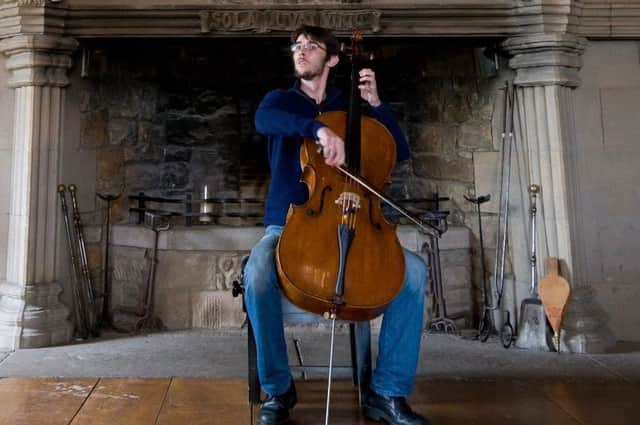Music review: The Lammermuir Festival Online


As we grow ever more familiar with online concerts – whether we love or loathe them – the question changes from what we’re seeing to how we’re seeing it. With its “Autumn Special” collection of online concerts, the 2020 Lammermuir Festival has taken quite a sophisticated approach on the concept, with performances filmed from several angles, TV-style presentation and incorporated online programme notes. It’s impressive stuff, well thought through, and more importantly, with its videos drenched in early autumn light from Haddington’s Holy Trinity Episcopal Church, it also serves to convey the live festival’s spirit of beautiful music in beautiful places.
Most crucial, clearly, are the performances themselves, and in focusing on artists who already have strong relationships with Lammermuir, co-artistic directors James Waters and Hugh Macdonald have not only gathered a gaggle of very fine musicians, but also generated a palpable generosity of spirit in their performances. That was evident in an exquisite and very touching account of Prokofiev’s Five Melodies from violinist Chloë Hanslip and pianist Danny Driver (****) on 8 September, in the first of four live simulcasts with BBC Radio 3, which beautifully captured the music’s strange beauty and spontaneity, as if the duo were making it up on the spot. If they might have taken things a little more simply in their opening Beethoven Violin Sonata in D, Op. 12 No. 1 (his first), they made up for it with a luminous performance of his final violin sonata, Op. 96 in G, which matched restraint with pinpoint precision, and an engaging playfulness in its stop-start finale.
Advertisement
Hide AdAdvertisement
Hide AdTenor Joshua Ellicott, joined by pianist Anna Tilbrook (*****), gave a glorious nature-themed recital the following day, beginning with three tender, thoughtful Schubert songs before blossoming into the more troubled romance of Schumann’s Op. 39 Liederkreis, which also allowed Ellicott’s lyric tenor to bloom into rich, radiant colours. They continued with five Vaughan Williams songs that rather magically matched visionary mysticism with a sturdy gruffness, and were all the more powerful as a result.
The multi-camera approach paid off brilliantly with the Navarra Quartet and cellist Philip Higham (*****) on 10 September, allowing quintet-wide shots as well as close-ups on individual players, and nicely choreographed to Schubert’s String Quintet, which formed the entirety of their hour-long recital. It was a fascinating, deeply human account – passionate and turbulent to the point of rawness in the opening movement and scherzo, yet alive with movement in its otherworldly slow movement too, and unafraid to expose the work’s precarious balance of hope and despair.
Pianist Roman Rabinovich (***) brought the festival’s four lunchtime concerts to quite a hard-edged conclusion with a rather steely-fingered reading of Beethoven’s Appassionata Sonata, probably not helped by close-miking. But by way of extreme contrast, Edinburgh guitarist Sean Shibe (*****) began the festival’s evening recitals with impeccable delicacy and nuance in a clutch of pieces from Scottish lute manuscripts, before drawing a remarkable range of colour from his instrument in Mompou’s Canción y danza and slightly more fiery Suite Compostelana. With his astonishing intensity and focus, Shibe can have you hanging on his every note – though he concluded with the raucous, ear-bending dissonances and uncompromising power of Julia Wolfe’s LAD, which he’d transcribed for multitracked guitars from its original version for massed bagpipes. It was at the other end of the sonic spectrum, maybe, but just as hypnotic in its siren-like slides.
The Navarra Quartet (*****) returned on 11 September in a perceptive performance of Britten’s Venice-inspired Third Quartet, which captured the work’s elusive sense of decaying extravagance to a tee, from restless duets in its opening movement to the endless repetitions of its visionary finale, drawing heavily on Britten’s opera Death in Venice. Mozart’s Piano Concerto No. 12 – for which the Navarra players were joined by pianist Tom Poster – provided a sense of brilliant release, and a thoroughly convincing five-player account that sparkled and tickled with freshness and fun, and felt like a true meeting of minds in its generous sense of give and take.
There’s been much to savour in the Lammermuir Festival’s online reinvention of itself, not least its persuasive adaptation to a digital format – and, even better, there’s the chance to enjoy the performances again for two weeks after the daily events come to an end tomorrow.
To listen online, visit www.lammermuirfestival.co.uk
A message from the Editor:
Thank you for reading this story on our website. While I have your attention, I also have an important request to make of you.
The dramatic events of 2020 are having a major impact on many of our advertisers - and consequently the revenue we receive. We are now more reliant than ever on you taking out a digital subscription to support our journalism.
To subscribe to scotsman.com and enjoy unlimited access to Scottish news and information online and on our app, visit https://www.scotsman.com/subscriptions
Joy Yates
Editorial Director